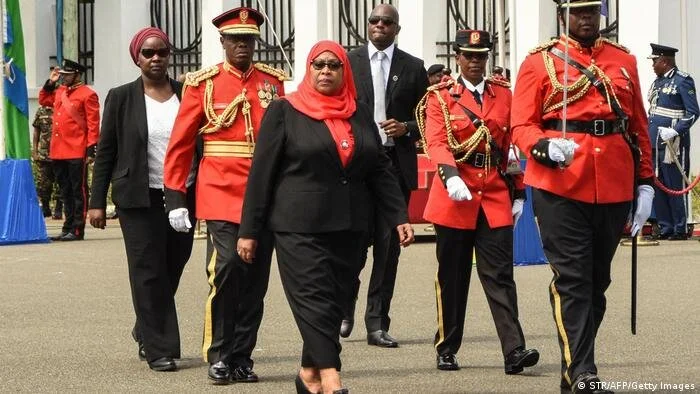Ascending to power in the wake of the repressive and violent Magufuli presidency, Samia Suluhu Hassan, traded on her middle name Suluhu – the Kiswahili word for ‘solution’ – by branding herself as the solution to Tanzania’s innumerable problems. Many, including myself, were hopeful that Tanzania had turned a new page, believing that Suluhu was incapable of subjecting us to her predecessor’s brutality. She presented herself as a mother figure, one who was committed to healing our nation.
The early signs were encouraging. Suluhu reversed the previous administration’s COVID-19 denialism by following the recommendations of a special advisory committee; she freed political detainees, including prominent clergyman who had been detained without trial for almost a decade; she ordered the Tanzania Revenue Authority to refrain from using extrajudicial measures to collect undue taxes and condemned illegal arrests and detentions, referring to both acts as ‘dhulma,’ a Swahili word meaning injustice or oppression.
In her first 100 days in office, Suluhu addressed parliament, held meetings with heads of states, met with civic and youth activists across the country, as well as business and religious leaders. The wave of optimism was palpable, spreading across Tanzania and international headlines.
Ominously, however, Suluhu denied a meeting with leaders of Tanzania’s political opposition, including the chairman of the largest opposition party, Freeman Mbowe. As head of CHADEMA, Mbowe represents the aspirations of millions of Tanzanians, many of whom have felt particularly marginalized and beaten down in recent years. This major red flag, and Suluhu’s wall of silence, was ignored at our collective peril.
Samia Suluhu is extremely controlled. She rarely displays emotion and maintains a strict adherence to scripted speeches, which are often infused with enough liberal democratic language to breathe life into the ‘Suluhu’ narrative. Nevertheless, she occasionally slips. And it is during these unscripted moments in which the real Samia Suluhu is revealed.
Her meeting with the Tanzanian press corps on June 28 – initially touted as an “olive branch” after years of attacks on press freedom – was Samia Suluhu’s first improvised speech. It was revelatory. In her typical measured tones, she was adamant that she would not tolerate press scrutiny as she expected journalists to treat her with the same respect they accord their own mothers, failing which they would be subjected to the full rigors of the laws of the land. A cold silence naturally descended over the room.
When later asked whether she would continue to impose her predecessor’s unconstitutional ban on political rallies, Suluhu’s response was categorical: yes. And on the question of instituting long-overdue constitutional reforms, she answered: not now. Suluhu explained that her priority was to transform Tanzania’s economy, concluding that economic progress requires peace and stability. In so doing, Suluhu repeated the claim that autocrats often utter without evidence: that democratic reforms will somehow lead to instability and hunger. The theory that peace and stability are the prerequisite for economic development is unfortunately premised on a misapprehension that political opposition to her agenda will result in instability. So, taking over where Magufuli left off, Suluhu made a declaration of war on anyone who defies her.
Several weeks later, authorities arrested several dozen members of CHADEMA for planning a symposium on constitutional reforms, contrary to Suluhu’s instructions that this was not a priority. In defiance, opposition leader Freeman Mbowe flew to Mwanza, the location of the planned event, to declare that the symposium would proceed. A few days later, on July 21, police surrounded Mbowe’s hotel, broke down his door, and arrested him in addition to several other CHADEMA members. The next day the police announced that Mbowe would be charged with terrorism, an offense for which he is not entitled to bail and for which he will be subject to indefinite pre-trial detention – a long familiar tactic of the previous Magufuli regime.
Mbowe’s official charge sheet is a farce littered with fantastical accusations. For example, he is accused of conspiring to bomb unknown petrol stations on unknown dates, using unknown explosives that were obtained from unknown places. He is further accused of providing an unknown sum of money to support unknown terrorist activities. Sadly, allegations without factual support suffice to charge anyone with terrorism in Tanzania – if there is, of course, sufficient desire from the right political quarters.
Thus, Samia Suluhu has already done that which even her brutal predecessor, John Magufuli, dared not to do. She has abused Tanzania’s criminal justice system to keep Mbowe, her chief political rival, in pre-trial detention for as long as she wishes.
It seems that overnight the carefully crafted façade of Mama Samia has dissolved. She has gone from being seen as a nurturing mother of a nation, not unlike Euripides’ Alcestis, to her antithesis, the wicked stepmother Medea. As in Western philosophy, Swahili culture portrays the stepmother as a manipulative and vindictive person, one who loses all female sensibilities and morphed into a wholly different form. If Freeman Mbowe’s arrest was designed to assert Suluhu’s strength, then it was a gross miscalculation. For although repression is culturally associated with so-called ‘strongmen,’ in the fairer sex it is typically associated with something else entirely. President Samia Suluhu would do well to bear that in mind, lest she is irredeemably altered into the archetypal anti-hero: the wicked stepmother.
Fatma Karume is a Tanzanian lawyer and human rights advocate. She is a former president of Tanzania's Law Society, a time during which she used her position to campaign for the independence of the judiciary law and the rule of law in the face of rising political authoritarianism. You can follow her on Twitter at @fatma_karume.
DISCLAIMER: The views expressed in this publication do not necessarily reflect the views of Vanguard Africa, the Vanguard Africa Foundation, or its staff.

